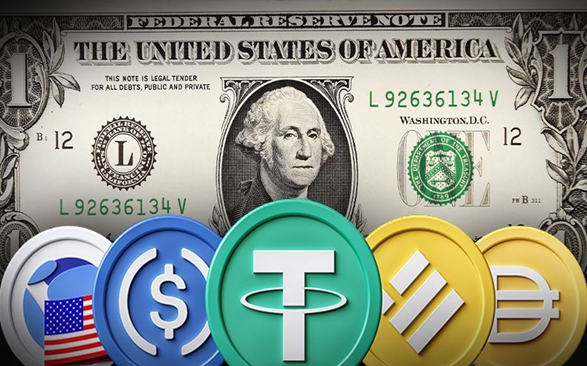In a significant move for the cryptocurrency industry, the US Senate has passed the Guiding and Establishing National Innovation for U.S. Stablecoins (GENIUS) Act with a bipartisan vote of 68–30. This landmark bill aims to regulate stablecoins, a type of cryptocurrency designed to maintain a stable value relative to a traditional fiat currency, such as the US dollar.
What the GENIUS Act Means for the Crypto Industry
The GENIUS Act establishes a regulatory framework for payment stablecoins, providing clarity and confidence around their use. By setting standards for stablecoin issuers, the bill aims to mitigate risks associated with these digital assets and promote their adoption. According to Treasury Secretary Scott Bessent, the bill could encourage the US dollar stablecoin market to grow nearly eightfold to $2 trillion over the next 10 years.
Senator Tim Scott, Chairman of the Senate Banking Committee, hailed the bill’s passage as a “bold step forward” for financial innovation and American leadership. Similarly, Sen. Mark Warner, though a Democrat, joined Republicans to pass the bill, although two Republicans voted against the Bill and 18 Democrats voted for the Bill: “For too long, stablecoins have operated in a regulatory gray area, putting consumers, markets, and national security at risk,” Sen. Warner wrote in a statement. “The GENIUS Act changes that by creating guardrails for responsible innovation, setting high standards for issuers, and reining in potential abuses by big tech and bad actors.”
Read also: US Democrat Senators Call for Safer Stablecoin Regulations
Key Provisions of the Bill
- Stablecoin Issuance: The bill requires companies creating stablecoins to hold actual dollars, Treasuries, or safe assets equal to the value of the coins they’ve issued. In other words, the reserve requirements of stablecoin issuers is 1:1 reserves backing their coins, comprising US dollars, Treasuries, or other approved assets.
- Regulatory Oversight: The GENIUS Act grants regulatory power to the Department of Treasury, Federal Reserve, Office of the Comptroller of the Currency, and FDIC. Stablecoin issuers with over $10 billion in market capitalization will be subject to federal oversight.
- Consumer Protection: The bill prioritizes stablecoin owners when a custodian or issuer files for bankruptcy and establishes anti-money laundering and anti-terrorism processes.
Despite concerns raised by some Democrats, including Senator Elizabeth Warren, about potential conflicts of interest and corruption, the bill was passed with bipartisan support.
Warren criticized the bill for not addressing potential conflicts of interest posed by President Donald Trump’s investments in cryptocurrency trading, including his stake in World Liberty Financial, which launched its own stablecoin, USD1.
Potential Economic Impact of the Genius Act
The GENIUS Act could significantly impact the stablecoin market in the United States by providing regulatory clarity and establishing a framework for stablecoin issuers. Here are some potential economic implications:
Positive Impacts:
- Increased Adoption: Clear regulations could lead to increased adoption of stablecoins, driving growth in the market and potentially reaching $2 trillion in the next 10 years, as estimated by Treasury Secretary Scott Bessent.
- Dollar Dominance: The GENIUS Act could strengthen the US dollar’s dominance in the global financial system by promoting the use of dollar-backed stablecoins.
- Bridge between TradFi, CeFI and DeFi: Stablecoins can serve as a bridge between traditional finance and blockchain-powered payments in the centralized finance (CeFi) and decentralized finance (DeFi) space, facilitating interoperability between centralized and decentralized systems.
Potential Concerns:
- Systemic Risk: Some experts warn that the bill’s requirement for stablecoin issuers to hold 1:1 reserves in US Treasuries could pose systemic risks to the US monetary system, particularly if the demand for Treasuries increases significantly.
- Restrictions on Innovation: The bill’s provisions, such as the ban on yield-bearing stablecoins and restrictions on non-financial firms issuing stablecoins, might limit innovation in the industry.
- Impact on Foreign Issuers: Foreign stablecoin issuers, like Tether, may need to comply with the provisions of the bill or face restrictions in the US market.
It will also be interesting to see how the introduction of the GENIUS Act in the US potentially impacts policy and regulatory approaches in other markets, especially regions with relatively high demand for the US dollar often due to local-currency volatility, devaluation, and even inflation.
Next Steps
The GENIUS Act now heads to the House of Representatives, where it will be considered alongside the STABLE Act, a competing bill. If passed, the GENIUS Act will mark a significant step towards establishing a regulatory framework for stablecoins in the US.
As the GENIUS Act moves forward, it remains to be seen how the House of Representatives will proceed and whether the bill will ultimately become law. One thing is certain, however: the fate of stablecoin regulation in the US hangs in the balance, and the crypto industry is watching closely.
Read also: The US Government harnesses stablecoins to bolster Dollar’s global dominance
Discover more from Crypto Asset Buyer
Subscribe to get the latest posts sent to your email.





